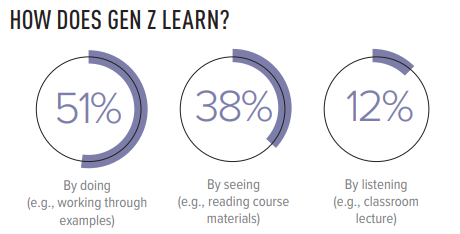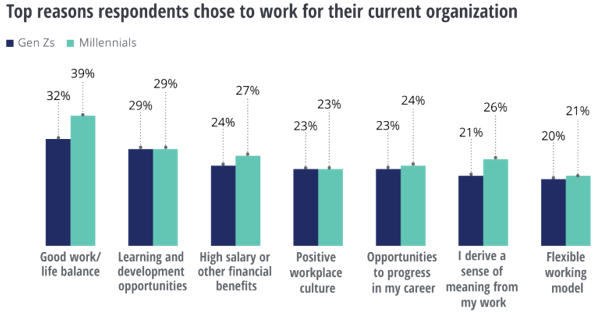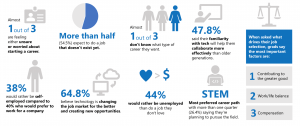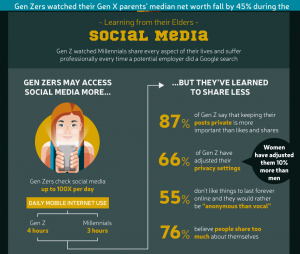The world of education is currently experiencing a significant change driven by the rise of Generation Z. This demographic, often referred to as digital natives, follows Millennials and precedes Generation Alpha. Growing up surrounded by smartphones, social media, and limitless access to information alongside globalization and social change has empowered these individuals to challenge conventional methods for teaching and learning. Nonetheless, this continuous exposure also brings forth worries regarding their learning focus, capacity to analyze academic content, and vulnerability to online distractions and misleading data. Generation Z students in the classroom exhibit distinct characteristics that challenge traditional teaching methods and pedagogical approaches (Tagare & Villaluz, 2021). They are accustomed to consuming information rapidly, multitasking across various digital platforms, and engaging in collaborative, interactive learning experiences. Consequently, they often gravitate towards hands-on, technology-driven learning environments that offer personalized, experiential learning opportunities tailored to their interests and learning styles (Tagare & Villaluz, 2021).
The Generation Z student’s approach to learning has evolved beyond the traditional four walls of a classroom and has progressed into the expansive digital world. They seek engaging and interactive educational experiences that utilize technology for sensory stimulation to fuel their creativity and encourage active involvement in the subject matter. Memorizing information from monotonous lectures does not satisfy them. Instead, they eagerly pursue dynamic opportunities where lessons come alive with real-world connections relevant to their studies (Weber & Keim, 2021).

Source: Barnes & Noble College | Getting to Know Gen Z – Exploring Middle and High Schoolers’ Expectations for Higher Education
Technology has been found to significantly impact the education of Generation Z individuals concerning improved learning outcomes and engagement (Jones et al., 2010). The usage of various technological tools, such as gamified learning platforms, virtual reality simulations, and multimedia educational resources, have all played a role in encouraging deeper understanding, developing critical thinking skills, and promoting collaboration among students. However, caution must be taken by educators regarding potential drawbacks associated with technology, including digital distractions faced, particularly during online lessons or discussions; privacy threats that may arise from data breaches; inequality in access levels for those who are not able to afford devices required for high-tech methods of teaching leading them potentially at an academic disadvantage compared other wealthier students.
A comprehensive study conducted by the World Economic Forum (2019) offers valuable insights into Generation Z students’ attitudes, behaviors, and preferences concerning their career and personal finance. Generation Z likes to start things themselves and take risks in new ways. They are not just interested in traditional careers like other generations. They also want the freedom to start their businesses or work independently. This allows them to be creative and work on their passion projects while having more control over how they spend their time.
In contrast to past generations, they are attracted to non-traditional career paths, freelancing opportunities, and startups that provide them with autonomy, flexibility, and outlets for creative expression. To harness this spirit of entrepreneurship amongst Generation Z students, educators can offer experiential learning modules in problem-based scenarios as well mentorship initiatives led by industry leaders who could impart valuable skills needed for thriving in an ever-evolving global economy along with internship experience at local businesses, which instills vital networks requisite for success. As Generation Z enters the workforce, they bring a set of expectations and values that differ from previous generations. They prioritize work-life balance, social responsibility, and purpose-driven careers over traditional notions of success and prestige.

Source: 2022 Deloitte Global Gen Z and Millennial Survey | Deloitte Insights | deloitte.com/insights
Microsoft surveyed with YouGov to find out what Generation Z college students are thinking about their future careers. The data shows that this group is tech-savvy and cares about values in the workplace.

Source: https://www.bestcolleges.com/careers/gen-z-career-guide/
The relationship between Generation Z and social media demands special attention as it is both a source of self-expression and community building and an issue with potential negative effects. While platforms such as Tiktok, Snapchat, and Instagram offer opportunities for creativity, studies suggest that excessive usage can have adverse consequences on Generation Z’s mental health, resulting in issues like anxiety/depression accompanied by low self-esteem concerns (Vizcaya-Moreno & Pérez-Cañaveras, 2020).

Image: Rave Reviews
Moreover, the pandemic exacerbated educational disparities, highlighting the importance of adaptable learning solutions for Generation Z (Nguyen & Patel, 2022). Students from marginalized communities residing mainly in rural areas or from lower-income households face significant difficulties when accessing quality education due to a lack of adequate internet connectivity/resource shortage amid socio-economic inequalities prevailing within their society (Marshall & Wolanskyj, 2020).
While pondering Generation Z’s complexities and how they influence education, research shows both immense opportunities and formidable challenges ahead. The current generation embodies a contradiction of the digital era as they strive to utilize technology for advancement and creativity yet struggle with its inherent unpredictability. On the one hand, their diverse backgrounds, entrepreneurial spirit, cultural fluency, and innate tech-savviness present endless possibilities ranging from personalized learning experiences to social activism endeavors on a global scale that can help open the way towards an inclusive society. On the other hand, important issues need our attention right now. These include mental health problems caused by the pressure of technology, unequal access to quality education for students, and the negative impact of social media on society. We must review societal norms critically and change our educational systems to address these concerns immediately. We must look at things from an analytical perspective to overcome the challenges before us. This includes questioning established norms and amplifying the voices of those affected by inequality and injustice while engaging in open discussions about sensitive issues. As teachers of Generation Z, it is our responsibility to make sure we raise kind and socially aware young people. By leveraging education as a means to effect change within larger communities beyond their immediate surroundings or spheres of influence – this next cohort has what it takes – critical thinking skills coupled with strong ethical standards make them prime candidates for leadership roles aimed at ushering positive transformations across multiple sectors.
Exploring Generation Z is more than just an academic pursuit – it is a moral obligation. It compels us all, from educators and researchers to policymakers and citizens alike, to take action, face the unsettling realities head-on, and work together toward creating a fairer society that embraces everyone in future generations.
References
Barnes & Noble College | Getting to Know Gen Z – Exploring Middle and High Schoolers’ Expectations for Higher Education
Jones, C., Ramanau, R., Rossade, K., & Healing, G. (2010). Net generation or digital natives: is there a distinct new generation entering university?. Computers & Education, 54(3), 722-732. https://doi.org/10.1016/j.compedu.2009.09.022
Marshall, A., & Wolanskyj, A. (2020). Covid-19: challenges and opportunities for educators and Generation Z learners. Mayo Clinic Proceedings, 95(6), 1135-1137. https://doi.org/10.1016/j.mayocp.2020.04.015
Nguyen, V., & Patel, T. (2022). Influence of the COVID-19 pandemic on learning preferences and perspectives of Generation Y and Z Students in dental education. International Journal of Dental Hygiene, 21(2), 487-494. https://doi.org/10.1111/idh.12602
Tagare, R., & Villaluz, G. (2021). Activity preferences of Generation Z students for tertiary physical education: implications for curriculum enhancement. Multidisciplinary Journal for Education Social and Technological Sciences, 8(2), 92. https://doi.org/10.4995/muse.2021.15492
Vizcaya-Moreno, M., & Pérez-Cañaveras, R. (2020). Social media used and teaching methods preferred by Generation Z students in the nursing clinical learning environment: a cross-sectional research study. International Journal of Environmental Research and Public Health, 17(21), 8267. https://doi.org/10.3390/ijerph17218267
Weber, K. and Keim, H. (2021). Meeting the needs of Generation Z college students through out-of-class interactions. About Campus Enriching the Student Learning Experience, 26(2), 10-16. https://doi.org/10.1177/1086482220971272
WEF (2018). Why Generation Z has a totally different approach to money”. World Economic Forum. November 30, 2018. Retrieved May 15, 2019.

